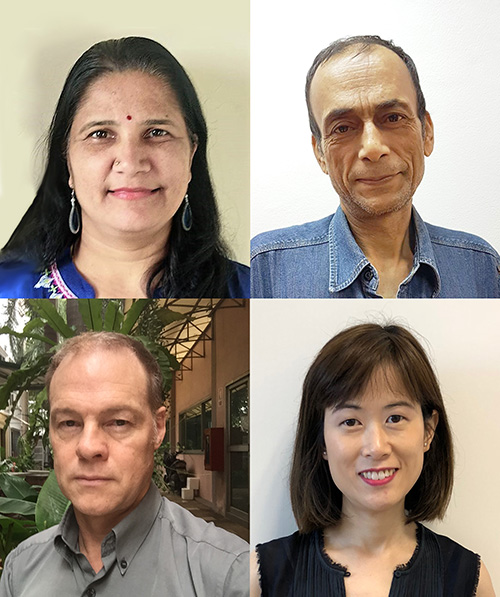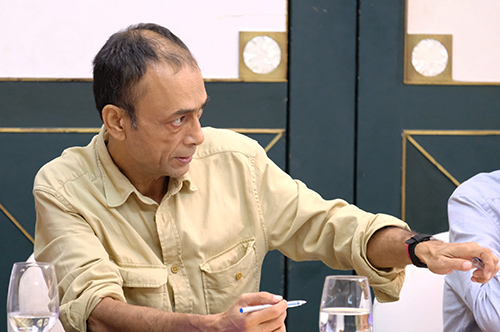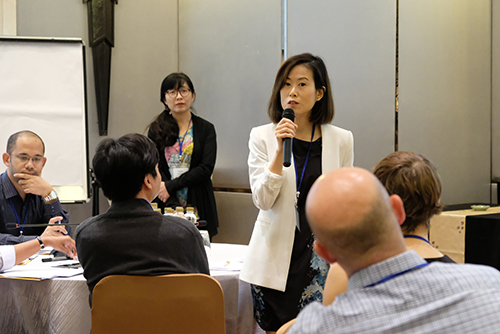People living with HIV are known to have higher rates of mental health issues than their uninfected peers, which can worsen their quality of life and affect adherence to HIV treatment. In the Asia-Pacific region, such issues are often inadequately studied and treated. Over the past two years, TREAT Asia has convened think tanks and trainings to prioritize and address associated research and clinical needs. We asked four individuals on the front lines of HIV and mental health care in Asia for their suggestions on improving mental health services for people living with HIV.

(Clockwise, from top left) Dr. Nishi Suryavanshi, Umesh Sharma Hidangmayum, Dr. Iris Chan, Dr. Donn Colby
Dr. Nishi Suryavanshi is a behavioral scientist and deputy director of the BJ Government Medical College and Johns Hopkins University clinical trials unit in Pune, India. Her behavioral research studies are focused on children, adolescents, and women living with HIV. She and her team are part of the TREAT Asia adult and pediatric networks.
“I hate my parents, for the sake of their enjoyment they spoiled my life, what was my fault? When I came to know about my disease, I could not believe” were the words of a 17-year-old girl with HIV who was diagnosed with anxiety disorder and displayed a lot of anger, denial, and helplessness related to the isolation and stigma that she faced. This is one of the many narratives from our ongoing study on mental health among adolescents with HIV in India.
Most programmatic interventions for women in the Asia-Pacific region focus on preventing vertical transmission of HIV but fail to investigate optimal and effective strategies to identify mental health needs and deliver psychosocial support. Due to discrimination in health and social structures in varied cultures, both youth and women with HIV often have mental health conditions that may be associated with poor clinical and social outcomes. The lack of mental health experts in many countries in the region limits our ability to adopt WHO recommendations for mental health integration into HIV services. One of the strategies to implement these recommendations is to adopt “task-shifting” of psychosocial interventions from experts (psychologists and psychiatrists) to non-expert healthcare workers in ART clinics, making effective mental health services more accessible. There should be more well-designed studies to assess mental health needs of youth and women, and to evaluate implementation of evidence-based interventions and assess their impact on mental health and HIV care outcomes. We need more opportunities to sensitize stakeholders and policy makers to integrate mental health services with HIV care.

Mr. Umesh Sharma Hidangmayum at the regional consultation: “Achievements, Lessons Learned, and Ways Forward on Hepatitis C Diagnosis and Treatment Access,”
August 23–24, 2018, Bangkok, Thailand
Umesh Sharma Hidangmayum is a program coordinator at the Asia-Pacific Network of People Living with HIV/AIDS (APN+) in Bangkok. He has worked at multiple national, regional, and international organizations focusing on drug use and harm reduction, including the International HIV/AIDS Alliance.
Stigma and discrimination associated with HIV/AIDS prevent individuals from accessing HIV-related services and interventions, disclosing their status to others, and joining support groups. In Asian settings, having both mental illness and HIV/AIDS means you face “double stigma.”
As far back as 2008, WHO recommended incorporation of mental health components in HIV/AIDS programs. However, many low- and middle-income countries have invested less than 1% of their health budgets to mental health services.
We face a severe shortage of human resources. The number of psychiatrists available for every 100,000 people is 0.13 in Bangladesh, 0.30 in India, 0.29 in Indonesia, 0.03 in Laos, 0.76 in Malaysia, 0.29 in Myanmar, 0.31 in Pakistan, 0.46 in the Philippines, 3.48 in Singapore, 0.36 in Sri Lanka, 0.87 in Thailand, and 0.91 in Vietnam (WHO 2014).
Suggestions for how we can improve mental health care for PLHIV:
Empower and engage PLHIV on mental health issues in civil society activities.
Advocate national governments to allocate resources to mental health in the HIV treatment cascade and include mental health in HIV treatment guidelines.
Implement more research and pilot programs that integrate mental health services into HIV care. These can include in-depth surveys of mental health and substance use in rural and peripheral sites.
Partner mental health professionals with providers in HIV treatment programs, making sure to pay attention to supporting PLHIV in rural settings. This can include building capacity for diagnosis and treatment or referral for treatment elsewhere.
Address stigma and discrimination within the community and among healthcare providers to improve the mental health condition of PLHIV.

Dr. Iris Chan at the TREAT Asia Adult Mental Health Think Tank, January 31, 2018, Bangkok, Thailand
Dr. Iris Chan is a clinical psychologist at Queen Elizabeth Hospital in Hong Kong SAR. She provides mental health care to patients at their HIV clinic, which is a TREAT Asia network site.
Research has consistently observed that people living with HIV (PLHIV) experience greater mental health issues as compared with the general population. These mental health issues not only compromise their quality of life, but also affect their ability to engage with medical care and adhere to HIV treatment.
The double stigma of HIV infection and mental illness also can prevent PLHIV from seeking treatment for either condition. Stigma should always be put in a social and cultural context. Recently, research conducted in Hong Kong found that there is a significant association between some prominent Chinese cultural factors (such as concern over loss of “face”) and perceived external stigma and self-stigma among people with drug dependence, which may be true for PLHIV as well.1 Therefore, regional mental health services have to consider relevant cultural elements when we try to adopt psychological treatment from the Western world. In the lifelong fight against both the disease and stigma, family is definitely the closest link for PLHIV. While most resources are still focused at the individual patient level, family-oriented HIV interventions could be a new direction in the field. The training of peer counselors and the setting up of community services that can reach PLHIV with mental health issues and their families is essential to create bridges to more formal health care settings.
1Ho CYY and Mak WWS, “HIV-related stigma across cultures: Adding family into the equation,” in Pranee Liamputtong (Ed.), Stigma, Discrimination and Living with HIV/AIDS: A cross-cultural perspective (New York, US: Springer, 2013), 53–69.
Dr. Donn Colby is a senior clinical research physician at the Thai Red Cross AIDS Research Centre in Bangkok, Thailand. He has conducted multiple clinical trials and epidemiology studies among MSM and transgender populations in Southeast Asia.
Men who have sex with men (MSM) and transgender women (TGW) are populations with unique needs in terms of mental health. Worldwide, MSM and TGW have higher rates of substance use and other psychiatric illnesses, and are at greater risk for HIV infection than the general population. Contributing factors include social isolation, stigma and discrimination, and barriers to accessing health care services. Transgender individuals in the Asia and Pacific suffer disproportionally from many risk factors for depression and substance use disorders, including gender-based violence, sexual abuse, and discrimination in education and employment.1 Moreover, in most Asian countries there are no legal protections against discrimination based on sexual orientation or gender identity.
The first step to solving these problems is to recognize and define them. While there are some data that people living with HIV (PLHIV) in Asia and the Pacific suffer from higher rates of mental illness and substance use,2,3 there is almost no information on the mental health of Asian MSM and TGW PLHIV. Better data are needed to fully understand the issues. Of equal importance is to address the lack of services that cater to the specific mental health needs of Asian MSM and TGW. There are few clinical programs in the region that have experience with or provide specialized mental health services to sexual minorities, or data on effective evidence-based treatment interventions. Pilot projects that provide both necessary services and opportunities to build up the evidence base of effective mental health interventions for Asian MSM and TG are much needed.
1Health Policy Project APTN, United Nations Development Programme. Blueprint for the Provision of Comprehensive Care for Trans People and Trans Communities in Asia and the Pacific. Washington, DC: Futures Group, Health Policy Project; 2015.
2Chibanda D, Benjamin L, Weiss HA, Abas M. Mental, Neurological, and Substance Use Disorders in People Living With HIV/AIDS in Low- and Middle-Income Countries. J Acquir Imm Def Synd 2014;67:S54-S67.
3Wright E, Brew B, Arayawichanont A, et al. Neurologic disorders are prevalent in HIV-positive outpatients in the Asia-Pacific region. Neurology 2008;71:50-6.